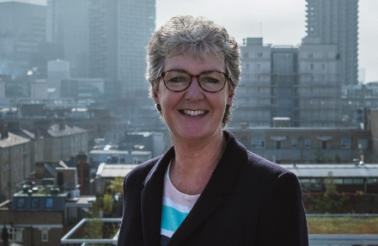Shelter’s new strategy is wide-ranging and ambitious. The charity has said it will beef up its digital offering, increase its strategic litigation, campaign more strongly for social housing and tenants’ rights, and focus more resources on the most complex cases.
For Helen Baker, chair of Shelter, all of this is driven by a feeling that housing in the UK has reached a state of crisis.
“Since the 1980s really there has been lower levels of home ownership and social housing building has collapsed,” she says. “There’s much less security and protection around quality of housing. Stagnation in wages and cuts to benefits have left more and more houses at extreme risk of homelessness.
“It’s come to a point where it feels like a national emergency. If we as an organisation, with the profile we have, didn’t stand up and do something really thoughtful and different, there was a risk this would get worse and worse.”
Six million households, she says, are in a state of housing insecurity. Right now, 90,000 are in temporary accommodation.
“So we’re looking at how we change to deal with that. First of all it’s about focus. We have to focus our face-to-face and telephone support on those with the greatest need. And there’s a particular emphasis on children. If children don’t have a home they move from place to place and it’s disruptive to their schooling and their ability to build relationships. It can do a lifetime of damage.”
Building its networks
The charity’s answer has been to reach out to partners, and to try and build up its networks. It will try to do less by itself, and more with small, local community organisations. Its target is to recruit 500,000 people as partners in a campaign for better housing. This, says Baker, is the most important element of the strategy.
“Last year, 4.7 million people came to us for help,” she says. “But we’re just one charity. We have a decent income, and superb staff and volunteers. Even so, that’s a lot of people for us to help.
“We work already through a series of local hubs across the country. We have shops all across the country. Our focus will be in making shops and community hubs the focus for community action. They will be centres for activism and collaboration. We will see our national resources focused on local need.
“We’ll work with everyone else who’s there in that local community. Where local services are well delivered, we will provide support. Where there are good services, but they need access to the kind of infrastructure we can offer, that’s what we’ll do. And where there are gaps we will fill them.”
The charity, she says, will use its resources and its experience to help local charities and community groups. She stresses that it is not about Shelter taking over, but about offering help where it is most useful.
“We’ve always been known for the strength of our legal advice,” she says. “We employ 40 or so specialist housing lawyers, and we can put that expertise out there in the system.
“Up until now most of our legal advice has been face to face, but we’re now going to step up our strategic litigation, and take more test cases that others can’t do.
“One of the things we’ve got is profile and clout. We can stick our heads above the parapet and take risks on behalf of others.
“This has been built from the bottom up. It’s about listening. It’s about what people tell us is really important. Nothing about Shelter should be top-down or hierarchical.”
‘We need to be a social movement’
One of the lessons she stresses is that housing, by itself, is not enough. It must be delivered in partnership with other organisations and agencies who help individuals with other aspects of their lives.
“So many people are having to make difficult choices about rent or eating or heating,” she says. “We need to see this as a social movement, about social injustice generally. We’re working on what we know about – housing and homelessness – but this is a small part of a broader set of issues which charities really need to work together to address.
“In so many situations where we work housing is one element of a complex network of support.
To succeed in supporting someone you need a wider group of agencies, but working in those kinds of partnerships is very challenging.”
Speaking out
The support of the public remains key as well, she says, and the charity is thinking hard about how it appears to supporters.
“There’s a massive brand project going on at the moment,” Baker says. “It’s not a rebrand. It’s not about our logo. It’s about what we say to the public. It’s about how everything we say is aligned. It’s important that what is said is the same for every part of the charity, and that what we say matches our behaviour. This project is about the character of the organisation.”
The biggest stakeholder, though, is government. Parliamentarians are beginning to get the scale of the issue, she says, but much more is needed. To do this, Shelter will help others to lobby.
“We’re good at campaigning but so are other people,” says Baker. “We want to create a platform and help them speak.
“Both Theresa May and Jeremy Corbyn have got it embedded now that we need more social housing, but we have got to keep the pressure up. And we need to speak out about tenants’ rights. The biggest cause of homelessness is people being evicted from private tenancy. One of the things we’re campaigning for is that it shouldn’t be legal to evict people without a reason.”
Despite the difficult environment for charity campaigning, and despite the fact that Shelter gets money from government, Baker is determined to carry on speaking out.
“I don’t think government is unsupportive of what we’re saying, they’re just distracted by Brexit,” she says. “But we have to be prepared to say things which aren’t popular. We do get some government funding, but the reason to have shops and a fundraising department is so you can say what you need to say.”
She is aware of some Conservative MPs who have questioned the charity’s role – “Shelter doesn’t provide any shelter” is a common criticism – but in the end, she says, it is not a popularity contest. The charity will continue to say what its beneficiaries need government to hear.
“This is a massive issue for the country,” she says. “Housing is a disaster area. It’s shaming that we have gone back to many of the conditions that first inspired Cathy Come Home, and the creation of Shelter, and we have to say so.
“It’s a fundamental moral right to have a home. It’s as important as your healthcare or your employment, but those rights are so much better protected by legislation.
“It’s time for that to change.”
Related articles











